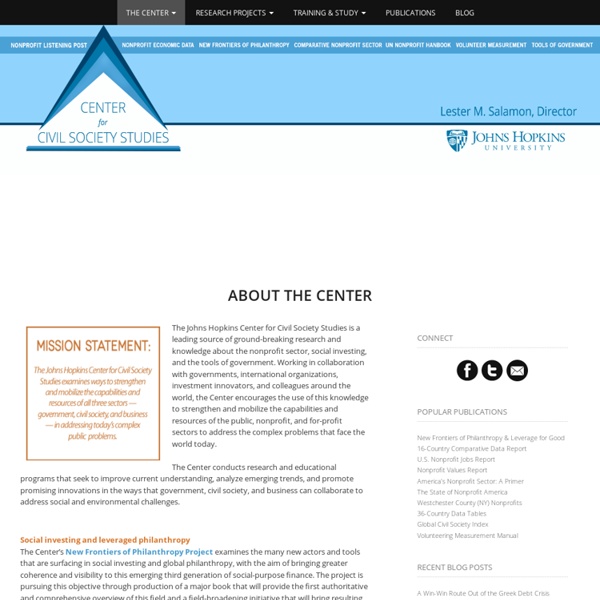



Sivil Toplum Geliştirme Merkezi The Open Book of Social Innovation The Open Book of Social Innovation – part of a series on methods and issues in social innovation – is about the many ways in which people are creating new and more effective answers to the biggest challenges of our times: how to cut our carbon footprint; how to keep people healthy; how to end poverty. It describes the methods and tools for innovation being used across the world and across the different sectors – the public and private sectors, civil society and the household – and in the overlapping fields of the social economy, social entrepreneurship and social enterprise. It draws on inputs from hundreds of organisations around the world to document the many methods currently being used. In other fields, methods for innovation are well-understood. The work is the result of a major collaboration between Nesta and the Young Foundation: two organisations that are committed to the role that social innovation can play in addressing the most pressing issues facing society today.
Center for nonprofit sector research About Centre for Nonprofit Sector Research The Centre for Nonprofit Sector Research (in Czech: Centrum pro výzkum neziskového sektoru, or CVNS) is a research institute of Masaryk University, based in its Faculty of Economics and Administration. Its economists, historians, lawyers, sociologists and political scientists research the current state of the Czech nonprofit sector and civil society and study their development from the perspectives of their academic disciplines and in cross-disciplinary and cross-national contexts. The Centre conducts both basic and applied research, as well as offering an education programme to graduate and postgraduate students. History The CVNS started work in October 2003. CINEFOGO The Universal Declaration of Human Rights Whereas recognition of the inherent dignity and of the equal and inalienable rights of all members of the human family is the foundation of freedom, justice and peace in the world, Whereas disregard and contempt for human rights have resulted in barbarous acts which have outraged the conscience of mankind, and the advent of a world in which human beings shall enjoy freedom of speech and belief and freedom from fear and want has been proclaimed as the highest aspiration of the common people, Whereas it is essential, if man is not to be compelled to have recourse, as a last resort, to rebellion against tyranny and oppression, that human rights should be protected by the rule of law, Whereas it is essential to promote the development of friendly relations between nations, Whereas Member States have pledged themselves to achieve, in co-operation with the United Nations, the promotion of universal respect for and observance of human rights and fundamental freedoms, Article 1. Article 2. Article 3.
TSRC - Third Sector Research Centre The Third Sector Research Centre works to enhance knowledge through independent and critical research. In collaboration with practitioners, policy makers, and other academics, we explore the key issues affecting charities and voluntary organisations, community groups, social enterprises, cooperatives and mutuals. News The future of TSRC TSRC's bid to renew our core funding from the ESRC Large Centres and Grants competition has been unsuccessful. Read more... Spotlight Unfolding tales of voluntary action What is the full story of third sector activity in communities struggling to manage tough economic and social challenges? This new monthly series will explore these issues and more, from the unique vantage point of TSRC's 'Real Times' project.
NCVO UK Civil Society Almanac | Your source for up-to-date statistics on the Voluntary Sector and Civil Society in the UK -- Stockholm 1972 - Declaration of the United Nations Conference on the Human Environment - United Nations Environment Programme (UNEP) -- Declaration of the United Nations Conference on the Human Environment The United Nations Conference on the Human Environment, having met at Stockholm from 5 to 16 June 1972,having considered the need for a common outlook and for common principles to inspire and guide the peoples of the world in the preservation and enhancement of the human environment, Proclaims that: 1. Man is both creature and moulder of his environment, which gives him physical sustenance and affords him the opportunity for intellectual, moral, social and spiritual growth. In the long and tortuous evolution of the human race on this planet a stage has been reached when, through the rapid acceleration of science and technology, man has acquired the power to transform his environment in countless ways and on an unprecedented scale. 2. 3. 4. 5. 6. 7. Local and national governments will bear the greatest burden for large-scale environmental policy and action within their jurisdictions. Principles Principle 1 Principle 2
Euclid A/res/55/2 1. We, heads of State and Government, have gathered at United Nations Headquarters in New York from 6 to 8 September 2000, at the dawn of a new millennium, to reaffirm our faith in the Organization and its Charter as indispensable foundations of a more peaceful, prosperous and just world. 2. 3. 4. 5. 6. • Freedom. •. • Solidarity. • Tolerance. • Respect for nature. • Shared responsibility. 7.